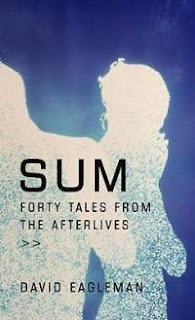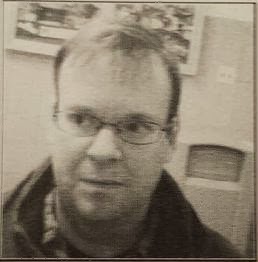Sum: Forty Tales From the Afterlives by David Eagleman is a small thing, a short read that I could probably finish off in one sitting if I were so inspired. It's a fascinating idea: 40 different theories on what happens to you when you die.
 Unfortunately, the idea is more interesting than the content. It does have some fascinating, mind-blowing ideas, but on the whole the book is mostly disappointing. Maybe that's what the afterlife is really like: you get all excited about the idea of it, but then it's anticlimactic.
Unfortunately, the idea is more interesting than the content. It does have some fascinating, mind-blowing ideas, but on the whole the book is mostly disappointing. Maybe that's what the afterlife is really like: you get all excited about the idea of it, but then it's anticlimactic.The title passage, "Sum", posits that in death we re-live all the moments of our life, but they are bunched together by activity. Therefore, we sleep for 30 years and spend six days clipping our nails. Seven months of non-stop sex. One year reading books. Twenty-seven intense hours of pain: broken bones, accidents, cuts, etc. Three weeks realizing you're wrong. You get the picture. Everything is clumped together.
Although the statistics would be interesting, it's kind of a stupid idea. As I was reading it, I protested, "But you can't just take all of these moments out of context like that." Relaxing on the couch after a long strenuous day is different from sitting on it for months at a time. But that is his point. He ends this story with the moral that we are fortunate that life is broken up into "tiny swallowable pieces." Like so many other theories in the book, it seems to point more to life than to death.
Almost every theory in the book points to one conclusion: when you die, you find out what the true nature of life and the universe is. (Which happens to be what I always hoped the afterlife would be like.) It's only that true nature that changes from story to story. There's also a very heavy Western bias in all the theories. They're mostly all about the Judeo-Christian God-- some anthropomorphized deity-- living in heaven. I had kind of hoped that the theories would be a little more out there.
The writing isn't that great, and a lot of the examples or conclusions he comes to don't make sense to me. He might have an interesting idea, but the implementation feels all wrong. For example, there's a theory about how you are represented in the afterlife by yourself at every age, so that your 5-year-old self might hang out with your 34-year-old self and your 67-year-old self. Neat idea, but then he goes on to say that many of your different selves realize they have hardly anything in common other than a name. Huh? Surely sharing the same life history and experiences counts for a strong bond, even if it's a teenager and an elderly version of yourself?
Still, as an idea book, it gets the job done. Some of his ideas are very similar to ideas I've had, and some are completely new to me. Those new and old ideas mingled and brought up new theories.
For example, as I was reading the book, I had this revelation that maybe I have already died dozens of times, but the superior being who is playing the "Game of Tim" keeps going back to an earlier saved version of the game and reviving me. I do this when I play computer games if I make a stupid fatal mistake. I go back and try again. Maybe that's what my life is like. That could explain why I'm convinced that things will work out in the end. Any fatal mistakes can be fixed by going back to an earlier saved version.
The book is a short read that can get your creative juices flowing, so I recommend it.
+++++
The other idea book I'm reading right now is The Time Traveler's Wife by Audrey Niffenegger.
 I really like this book. Besides the fact that its main character is a librarian who lives in Chicago, it brings up fascinating ideas that branch off in all different directions.
I really like this book. Besides the fact that its main character is a librarian who lives in Chicago, it brings up fascinating ideas that branch off in all different directions. Henry has Chrono Displacement, a genetic condition where he travels through time with no control over when and where. He is married to Clare. At their first first meeting, she is 6 and he is in his 30's. At their second first meeting, she is 20 and he is 28. She has known him her whole childhood, but he has no idea who she is. But his future self has visited her throughout her childhood. Encounters between them happen at different ages, so that when a 32-year-old Henry visits a 14-year-old Clare, he doesn't yet have a memory of when his 40-year-old self visited her when she was 9.
It brings up a lot of weird issues, like: would it be wrong to sleep with your wife when she's 16 and begging for it, when you're a 35-year-old guy and married to her older self? (He doesn't.) Would you tell your friends and family their future? Would you "get intimate" with a younger version of yourself? (He does.)
The circular determinism brings up all sorts of questions about free will. Henry visits Clare when she's a child because they're married, but the only reason she falls for him as an adult is that he was such a huge part of her childhood. It turns into quite a mindfuck if you think too hard on it.
But it's a fun mindfuck.
+++++
Like most of my book reviews, I'm only halfway through The Time Traveler's Wife, so if you're like Henry and you know my future, don't tell me what happens. I guess there's a movie, too, and I'd like to see that when I'm done with the book.


1 comment:
the time traveller's wife was okay. i am not generally picky on the books i read, as i read pretty much everything and anything. i liked the idea of the story, but i didn't find it to be that great. i don't know why. hmm. maybe i should reread it.
Post a Comment